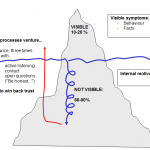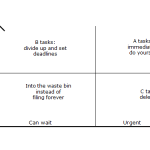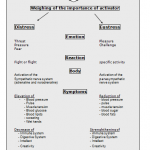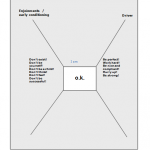Corkscrew Dialogues: Dive down beneath the visible surface of symptoms to the area of internal motivations, to bring old problems to the surface and air them Example: A woman arrives late. Her husband is ill and she had to take a child to the kindergarten […]
Yearly Archives: 2012
Meeting Conditions
Considerations on the meeting conditions Many meetings fail or become a breeding ground for conflict because the necessary clarifications have not been communicated in advance. Role, relationship Preconceptions about role, purpose and intentions remain hidden and lead to misunderstandings for others. What role am I acting in? What hat do I have on? The same […]
4 dimensions of non-verbal communication
Overview Which is the most important skill in conversation? There are many varied answers to the question of which is the most important or central skill in communication (and hence also in leadership). Asking the right questions, the art of formulation, framing, structure and construction of conversations, attitude and view of humanity. One […]
Meeting Preparation
Questions on meeting preparation What is the reason for the meeting? What advance information do I have? Is it about facts? What have I noticed myself? Is the information first or second hand? Can it be used? What information is based on assumptions? Which role am I acting in? Is this part of my role? […]
Self- Coaching
1. Basic feelings Indication: Conflict in the system (family, career, group …) Goal: X wants to be able to behave more flexibly towards Y, in order to remove the feed from the conflict which is putting such a strain on X himself and the system. Method: […]
Eisenhower-Matrix
In order to cope with the large number of tasks in a working day, the first step must be to put these into some kind of order. Eisenhower’s matrix is an extremely effective technique for this. The tasks are sorted by two criteria, "importance" and "urgency". According to this, there are four […]
Personal inner drivers – test
Driver Test Please read the statements below carefully and then answer how much these statements apply to you actually using the evaluation scale: totally = 5 mostly, generally = 4 a little bit = 3 nearly not = 2 not at all = 1 1. ( ) When I fulfill a task […]
Personal inner drivers
Every person in our performance oriented society is influenced by inner attitudes, beliefs and behavioral programmes that either help or hinder him. In the minds of modern people there exist five principally hindering attitudes that have an influence on the behavior. These attitudes especially appear in distress and seem to be helpful, while in reality […]
Schau mir in die Augen! – So füllen Sie Ihre Kaffeekasse.
Schau mir in die Augen!
So füllen Sie Ihre Kaffeekasse.
Wenn Menschen sich beobachtet fühlen, verhalten sie sich sozialer.




